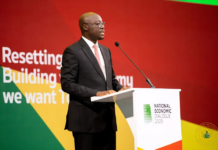
The Bank of Ghana (BoG) has developed a new Liquidity Assistance Framework (LAF) to provide emergency financial support to solvent Banks, Savings and Loans Companies as well as Finance Houses (BSF) when the need arises.
The LAF move, according to the BoG, was to promote financial stability and minimise moral hazard as well as risks to the BoG’s balance sheet.
The new policy and operational framework which covers Intraday Liquidity Facility (ILF) and Emergency Liquidity Assistance (ELA), is also to forestall the recent banking crisis, among others, occasioned by poor governance and corporate practices and low liquidity of banks.
A document on the LAF copied to the media in Accra on Friday, said the exercise was in line with the Section 3 of the BoG Act, 2020 (Act 612) as amended by the BoG Amendment Act, 2016 (Act 918).
Under the section, the BoG is mandated to maintain price stability, promote the effective and efficient operation of the banking and credit system and contribute to the maintenance of financial stability in Ghana.
The LAF said the new ILF “is to support the efficient functioning of the payment and settlement systems and the ELA is to provide liquidity support to eligible and solvent BSF facing temporary liquidity challenges.”
The document explained that the two liquidity instruments supplement the Global Master Repurchase Agreement (GMRA) backed reverse purchase facility that the BoG current provides to banks as part of its monetary policy framework.
“The ILF and ELA framework has been designed to address weaknesses that were identified by the BoG during the recent banking sector crisis, and aims to promote transparency, allow better liquidity planning by BSFs while protecting the balance sheet of the BoG,” the LAF document said.
Under the ILF, the LAF said participating banks were required to maintain sufficient positive balances in their settlement accounts to meet their obligations with the Ghana Interbank Settlement system on real time basis.
That, the document explained, would prevent settlement failures which could adversely impact financial stability and monetary policy transmission.
“To mitigate the probable risk of settlement failure resulting from insufficient balances, the BoG has made available an ILF to all participating banks in the GIS system terms and conditions,” it said.
The LAF indicated that an ILF facility shall be secured with eligible collateral that would be subject to haircut requirements and an unpaid ILF after the final cut-off time would attract a one per cent penalty on the due amount and shall be deemed to constitute a request for an overnight reverse repo that would attract the highest prevailing overnight repo rate.
On the ELA, the LAF said the “ELA accessed by a BSF shall be used solely for honouring customer withdrawals and meeting non-capital-related debt obligations as shell be indicated in the request to the BoG.”
The LAF said a bank must be solvent, viable and meet the BoG’s prescribed minimum capital adequacy ratio, be experiencing temporary liquidity challenges, demonstrate that it had exhausted all avenues for addressing its temporary liquidity challenges and have eligible collateral to adequately secure the exposure.
In pursuance of its objectives, the BoG among others, provides liquidity backstop to eligible solvent financial institutions facing temporary liquidity stress and as such, the BoG provides ILF to banks for efficient functioning of the payment and settlement systems, and ELA to an applicant BSF to safeguard financial stability.
Ghanaian Times
























